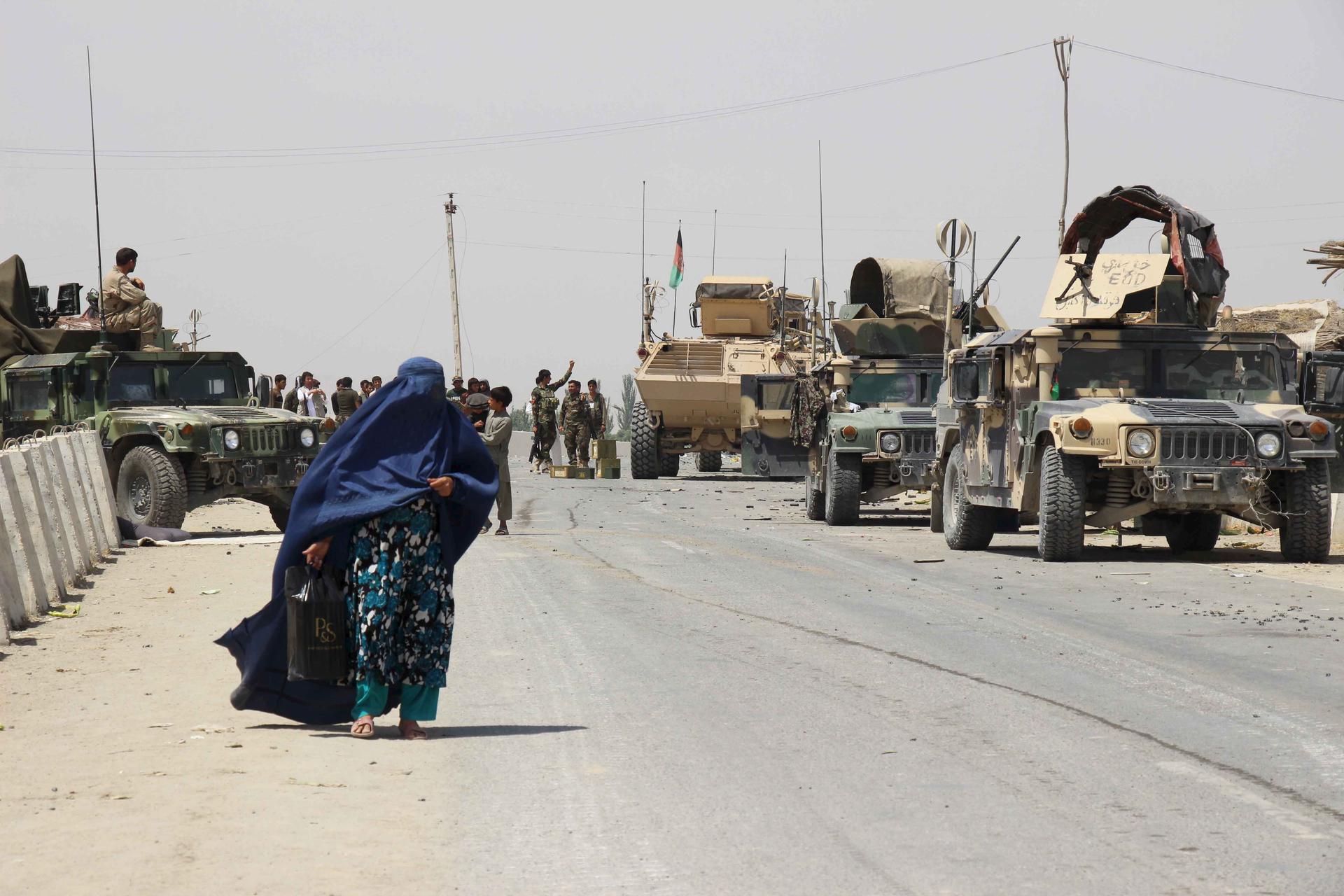Uncertainty abounds for Afghan city after Taliban takeover
An Afghan woman walks passes while the Afghan National Army (ANA) troops keep watch at a checkpoint this past June at Chardara district, in Kunduz province.
The collapse of Kunduz, a major northern Afghan city, has created a wave of anger and angst both here and abroad.
Hand-wringing among Afghans over the inability of the Afghan National Security Forces to defend territory from the Taliban has accompanied harsh judgment that the international community has abandoned Afghanistan in its hour of need.
Certainly the sight of the Taliban’s white flag flying in Kunduz will generate fear, perhaps even panic, in many circles. But the full story, which is still emerging, is likely to be much more complex than a government-versus-insurgent narrative.
A deeper look begins with the irony that the Taliban took Kunduz on the one-year anniversary of Afghanistan’s formation of a national unity government (NUG). Ashraf Ghani was sworn in as president on September 29, 2014, and in a deal brokered by US Secretary of State John Kerry, promptly created the position of CEO for his election rival Abdullah Abdullah.
It was a consequential bargain, and one that has cost the nation dear. There is consensus that NUG’s inability to form a cohesive administration is largely to blame for the fact that Kunduz is now being consumed by chaos.
Almost before the Taliban entered Kunduz, rumors were swirling that the provincial governor, Mohammad Omar Safi, had been complicit in the takeover and had fled to London. The rumors have been firmly denied by the government, but this is not a war of facts. Safi is a Pashtun, and was appointed governor by Ghani last December.
Abdullah’s team then insisted on naming the chief of police, General Abdul Sabur Nasrati ,a Tajik and a bitter opponent of the governor.
Ghani and Abdullah have clashed over militias — the armed groups created and funded by the US back in 2009 to help fight the Taliban. Instead, in many places including Kunduz, they have engaged in the kind of behavior typical of the civil war: raping, looting, illegal taxing, even murder.
The predations of the warlords so disgusted the population that many welcomed the Taliban in 1996. It is the misbehavior of the militias that have some people longing for the relative order of the Taliban days.
The provincial governor Safi promised to clean up the militias; the chief of police Nasrati objected that the armed groups were necessary to defend the province.
There has been fighting in Kunduz for months. District after district has gone to the Taliban, and there has been ample warning that the insurgents were aiming for the provincial capital.
But the carping and infighting between the governor and his police chief kept the administration from taking any real action.
Reports from Kunduz are chaotic in the extreme, say sources on the ground. The city is without power, and locals say that the fighting is raging all around them. Most do not dare venture out even for bread, and food is running low.
Shops are being looted andsome blame the Taliban, while others say it is criminal gangs.
The Taliban has issued a statement on its website declaring that it has no intention of “transgressing against ….personal property, carrying out extrajudicial killings, looting or breaching the inviolability of homes.” The group also urges residents to go about their normal business: “Carry out your ordinary livelihoods in absolute security,” the site reads. “All traders, workers, staff of hospitals, municipality and governing bodies should continue their daily routines without any fear or intimidation.”
Reports abound that the Taliban has killed doctors, while others say the medics were caught in the crossfire.
The International Federation of Journalists reported that the Taliban torched a women’s radio and TV station.
The government has pled for calm. President Ghani gave a press conference on Tuesday assuring the nation that “Kunduz City is being cleared of terrorist groups.”
Twitter also has numerous reports from various sources that the Afghan National Security Forces (ANSF) were on the march. The US has also initiated airstrikes against Taliban positions.
It is a strong possibility that the ANSF, with US help, will retake Kunduz in the near future.
But that will not solve the deeper, more intractable problem: ethnic, political and regional tensions are ripping the country apart.
While Kunduz may be saved, the fate of the national unity government is much more in doubt.
This story was produced by The GroundTruth Project. For further discussion and analysis of the war in Afghanistan, listen to the GroundTruth Project's podcast here.
